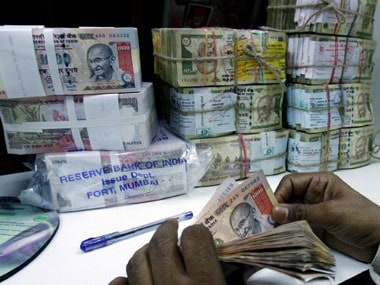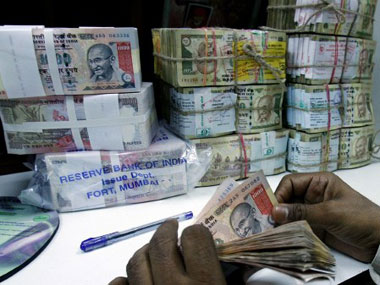The Specified Undertaking of Unit Trust of India (SUUTI) has appointed three merchant bankers for the sale of 23.58% stake that it holds in Axis Bank, the third largest private sector bank in the country. As of January 21, 2014, the value of this stake works out to around Rs 13,157 crore. This sale will help the government control its burgeoning fiscal deficit. Fiscal deficit is the difference between what a government earns and what it spends.
But the question is does this money really belong to the government? In order to answer this question we need to go back more than ten years and understand why SUUTI was formed in the first place. By 2001, several assured return schemes as well as Unit Scheme-64 (US-64) of the Unit Trust of India (UTI), were in a mess. The government had to come to the rescue of the investors.
[caption id=“attachment_1300769” align=“alignleft” width=“380”]  AFP[/caption]
In the wake of the crisis, UTI assured unit holders having 5,000 or less units that their units would be redeemed any time between 1 August 2001 and 31 May 2003. The incentive to hold on was the promise of Rs 12 for every unit worth Rs 10, if it was redeemed in May 2003.
The assets of UTI were divided into UTI-I and UTI-II. The government took responsibility for UTI-I, to which US-64 and all the assured return schemes of UTI were transferred. UTI-I came to be known as SUUTI and UTI-II became UTI Mutual Fund.
Impact Shorts
More ShortsSUUTI continued to repurchase units of US-64 even after May 2003. The first 5000 units were bought back at the rate of Rs 12 per unit and the remaining at the rate of Rs 10 per unit. Alternatively, investors were offered 6.75% tax-free US-64 bonds maturing in five years, in lieu of their investments.
Of course, the investments that had been made by the assured returns schemes as well as US-64 were transferred to SUUTI. These investments included stocks like Axis Bank (or what was then known as UTI Bank), L&T and ITC.
Now given that the government rescued the investors in the scheme, shouldn’t it be cashing on the shares owned by SUUTI? The argument is not as straight-forward as that. A lot of investors who invested in UTI were essentially retail investors. They parked their hard earned money into the scheme on the understanding that UTI was a government undertaking.
The government, instead of managing the scheme well turned it into a Ponzi scheme. Take the case of US-64, the flagship scheme of UTI. US-64 was launched on July 1, 1964. It was designed to be a balanced fund sort of scheme, which invested both in shares as well as debt securities. But things started to change from 1993, once the government started disinvesting its stakes in public sector enterprises. These shares were offloaded by the government on to UTI and other government owned financial institutions.
In June 1987, debt securities formed nearly 64% of the corpus of the scheme. By June 2000, this had dropped to 26%. Hence, US-64 became an equity scheme from being a balanced scheme. Interestingly, a lot of the investment in equity went into shady companies. US-64 also accumulated a lot of investments in the so called K-10 stocks, which were being rigged by Ketan Parekh.
Other than making bad investments, US-64 was also paying dividends way beyond what it could afford. In its first year of operation US-64 had paid a divided of 6.1%. It gradually rose to around 10% by 1979-1980. By 1990-1991 this had gone up to 19.5%. This reached 26% in 1992-93, staying there for the next few years.
With the dividend payouts going up dramatically, the income of the scheme also needed to continually keep going up, in order to ensure that UTI could continue maintaining such high dividend levels. UTI had built up very high reserves as it retained a certain percentage of its income and did not give out its entire income left after accounting for expenses as dividend to the unit holders every year.
So UTI dipped into its reserves to continue paying a dividend of 26%, till 1995-1996 because it did not want to lower its dividends. Over the years the dividends paid out were larger than the income of the unit trust. It made up for the difference by dipping into its reserves. But it soon ran out of reserves as well. The next thing it did was that it started to use the money that the new investors brought into US-64 to pay the dividends.
US-64 thus degenerated into a Ponzi scheme, where money being brought in by the new investors was being used to pay off the older investors. On September 30, 1998, a shocked investing public came to know that the reserves of US-64 had turned negative by Rs 1098 crore. On 28th February 2001, UTI managed funds amounting to Rs.64,250 crore or more than 13% of the market capitalization of the Bombay Stock Exchange. It was around this time that some serious bungling seemed to have taken place. UTI accumulated substantial holdings in what came to be known as the K-10 stocks. These were companies in which leading stockbroker Ketan Parekh had made big investments.
While Parekh withdrew from these stocks, UTI continued to hold onto them. In a private placement exercise, UTI picked up 3.45 lakh shares of Cyberspace Infosys at a price of Rs 930 when the market price was Rs 1100. The price of the stock later fell to Rs 11.
UTI also accumulated significant stakes in unlisted entertainment and media companies, acquired at prices between Rs 250 and Rs 500 per share. This again seemed to be an attempt to mirror Ketan Parekh’s strategy. After moving out of K-10 stocks, Parekh took a fancy for the stocks of unlisted media and entertainment companies. Most of these companies put their Initial Public Offer(IPO) plans on hold, blocking UTI’s exit route.
This was the final nail in the coffin of US-64 and UTI, and the government had to come to its rescue.
As Dhirendra Kumar writes in a column on www.valueresearchonline.com “The government supposedly mounted this rescue and gave the poor investors something. However, the fact that the investors lost out was not their fault. These weren’t people who invested in some shady Ponzi scheme. They trusted the Government of India and invested in that magnificent institution called the Unit Trust of India. Effectively, the government ran UTI to the ground, bought back the assets of its victims for a pittance by offering them a Hobson’s choice, and is now ready to make a killing by selling off those assets when the equity markets are much higher.”
Given this, the profits that the government is now likely to make by getting SUUTI to sell the stake that it holds in Axis Bank, actually belongs to the investors of the assured return schemes and US-64 of UTI.
(Vivek Kaul is a writer. He tweets @kaul_vivek)


)

)
)
)
)
)
)
)
)



